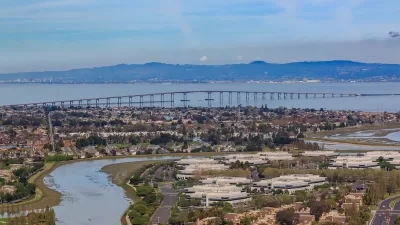To paraphrase the New York Times' summation of the Anaheim Angels' rhetorical exodus to Los Angeles a few years ago: some ideas are so stupid that you just have to stand back and watch. To that I would add, some things are so stupid that they deserve derision no matter how long ago they occured. Though it crawled out from the Senate floor in the summer of 2005, SAFETEA-LU -- the $240 billion federal transportation bill -- has, for the past two years, gotten off way too easy.
To paraphrase the New York Times' summation of the Anaheim Angels' rhetorical exodus to Los Angeles a few years ago: some ideas are so stupid that you just have to stand back and watch. To that I would add, some things are so stupid that they deserve derision no matter how long ago they occured. Though it crawled out from the Senate floor in the summer of 2005, SAFETEA-LU -- the $240 billion federal transportation bill -- has, for the past two years, gotten off way too easy.
The bastard child of Rep. Don Young (R-Alaska), 1998's TEA-21 legislation, and the Keebler Elves, SAFETEA-LU sounds like a cookie but instead promises to patch the nation's roads and choke off the nation's transit agencies. It governs the distribution of highway funds to the various states and, of course, to special projects like the infamous "Bridge to Nowhere" and a replica of Noah's Ark.
Granting that no one short of Thomas Jefferson has ever penned perfect legislation, we still should not overlook the heinous -- and entirely avoidable -- offense that is propogated in every dime of SAFETEA-LU's $240 billion: its name.
Time was that silver tongues like Jefferson, Paine, Lincoln, FDR, and William Jennings Bryant took care to sprinkle eloquence into political discourse. They understood that ideas worth fighting for were also worthy of precise diction and potent metaphor. They strove for clarity and taut brevity, long before laziness begat the acronym. Abraham Lincoln summed up the democratic struggle in all of 278 words. None of those words was "accountable" or "users." More importantly, none of them made promises that he could not keep.
Hegemony, however, has a way of degrading rhetoric. Gone are imagery, allusion, irony, and metaphor. Our battlements are so thick and our government so insulated by its own power that communicating beyond the fortress has sunk to an afterthought. So it happens that the highways that enribbon the continent recieve their share of national treasure by virtue of a contrivance that goes by the name of the Safe Accountable Flexible Efficient Transportation Equity Act--A Legacy for Users. When this mouthful reduces to the more common short version, the hard e and lilt at the end mean that you can't help smiling when you say it.
But almost no one seems to get the joke. In covering infrastructure in California, I've read countless interviews and gone to enough speeches that mentioned SAFETEA-LU, and neither friend nor foe has ever blanched at its name constructed about as well as certain bridges in Minnesota.
I conducted a Google search of combinations of "SAFETEA-LU," "acronym," "stupid," "retarded," "moronic," and "Jessica Biel bikini." It's still a great country, but in a world full of irate blowhards and universal Internet access, SAFETEA-LU inspired a mere two blog posts, courtesy of the ever-reputable "Wonkette" and "Hammer of Judgment," plus one citation. While there's no shortage of libertarian rants about its allocations, every other reference accepts the wisdom and eloquence of legislators at face value.
It's a deeply subversive tactic--the sort that George Orwell warned of back when we knew what fear really was. It's not as offenseive as the USA PATRIOT Act, but by asserting its supposed virtues so brazenly, SAFETEA-LU seeks congratulation when nary a bucket of cement has been poured. Moreover, it venerates virtues that should be preqreuisites for anything in the realm of the poeple's business -- as if by another name the transportation bill would have been unsafe, unaccountable, and inflexible?
Just as a matter of principle, no noun this side of Little Richard should ever take more than two adjectives. But consider the adjectives in question:
Safe: An acronym that spells out one of its component words is redundant in the first place. Even so, roads can be safe. Cars can be safe. Bridges can be safe (sometimes). Even then, they are safe only after years of use and study; something can not be preemtively safe. Acts of legislation, however, cannot be safe.
Accountable: From a word we understand -- safe -- to a word that could mean almost anything. Is it accountable to voters? Or just to the legislators themselves? If "accountable" means "not corrupt," then the pork in SAFETEA-LU contradicts this rosy assertion.
Flexible. Fine. It's flexible, but only after an entire nation decries your bridge and Congress threatens a vote to remove it from the bill.
Efficient: Nothing with an eleven-word title could be efficient.
Transportation: Now were're getting somewhere (but only figuratively).
Equity: This is not so much a semantic offense as it is a moral one. When some states -- such as the one with the largest population, worst traffic, and greatest total vehicle miles travelled -- get 92 cents for every federal gas tax dollar, equity has yet to arrive. Probably because it's stuck in traffic.
Here's the one we've all been waiting for: LU -- "a Legacy for Users." This is where Congress loses its grip not only on English but on logic itself. The measure of a legacy belongs to the future; calling SAFTEA-LU a legacy is like calling a birth announcement a memior. And "users"--as opposed to whom? Spectators? Squirrels? The legislators themselves? As it turns out, that's exactly who the "legacy" is for, because Lu happens to be the name of Don Young's wife. If that's what passes for romance in Alaska, then I'll take a pack of sled dogs and a bottle of Jim Beam.
I could go on. I don't, however, want to waste my evening ridiculing politicians. That's too easy.
What's more difficult is understanding the combination of ignorance, indifference, and polite condescention that sustains so many political careers and forgives so many atrocities. SAFETEA-LU has appeared countless times in print and speech. It was vetted by lobbyists, watchdogs, and pundits, on top of the 535 legislators, one president, and millions of Americans whose high-school education was supposed to confer literacy upon them. If commentators, opinion leaders, and the general public are willing to forgive obfuscation, egotism, and artlessness then the race is on to see which will crumble first: America's roads or democracy itself.

Planetizen Federal Action Tracker
A weekly monitor of how Trump’s orders and actions are impacting planners and planning in America.

Restaurant Patios Were a Pandemic Win — Why Were They so Hard to Keep?
Social distancing requirements and changes in travel patterns prompted cities to pilot new uses for street and sidewalk space. Then it got complicated.

Map: Where Senate Republicans Want to Sell Your Public Lands
For public land advocates, the Senate Republicans’ proposal to sell millions of acres of public land in the West is “the biggest fight of their careers.”

Orange County, Florida Adopts Largest US “Sprawl Repair” Code
The ‘Orange Code’ seeks to rectify decades of sprawl-inducing, car-oriented development.

Maui's Vacation Rental Debate Turns Ugly
Verbal attacks, misinformation campaigns and fistfights plague a high-stakes debate to convert thousands of vacation rentals into long-term housing.

San Francisco Suspends Traffic Calming Amidst Record Deaths
Citing “a challenging fiscal landscape,” the city will cease the program on the heels of 42 traffic deaths, including 24 pedestrians.
Urban Design for Planners 1: Software Tools
This six-course series explores essential urban design concepts using open source software and equips planners with the tools they need to participate fully in the urban design process.
Planning for Universal Design
Learn the tools for implementing Universal Design in planning regulations.
Heyer Gruel & Associates PA
JM Goldson LLC
Custer County Colorado
City of Camden Redevelopment Agency
City of Astoria
Transportation Research & Education Center (TREC) at Portland State University
Camden Redevelopment Agency
City of Claremont
Municipality of Princeton (NJ)






























